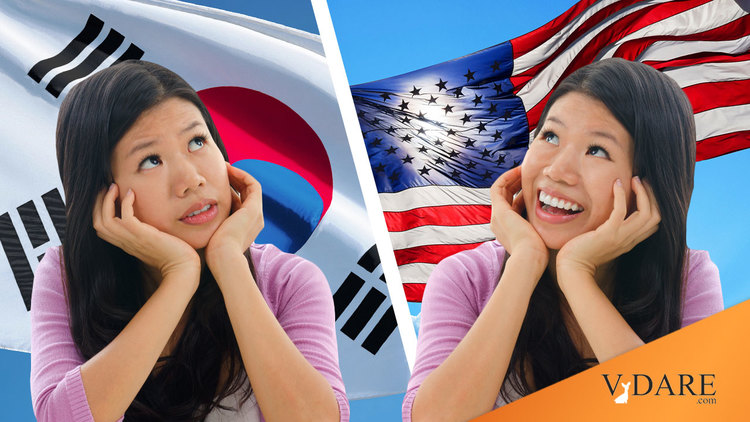
By Steve Sailer
05/09/2022
Nancy L. Segal at Cal State Fullerton is a leading expert on twins. She is the professor to call if you have some crazy twin story of scientific interest, like her 2015 account of two pairs of South American identical twins who got switched in the hospital and grew up believing themselves to be fraternal twin pairs, one in the city and one in the country, until being reunited in their 20s.
Now she’s done a case study of a pair of South Korean identical twin girls, one of whom got lost at age 2 and wound up adopted by an American family and raised in the U.S. That’s a pretty huge difference for identical twins raised apart studies, since they usually stay in the same country, often with relatives of one or the other parent (and generally middling income folk who can afford to take one child but not two children).
The twin who stayed home in South Korea scores 16 points higher on an IQ test:
Psychologists found a “striking” difference in intelligence after examining twins raised apart in South Korea and the United States
by Eric W. Dolan May 7, 2022A new study of monozygotic twins raised apart in South Korea and the United States provides unique insight into how genetic, cultural, and environmental factors influence human development. The new research has been published in the scientific journal Personality and Individual Differences.
“I have studied identical twins reared apart for many years. They pose a simple, yet elegant experiment for disentangling genetic and environmental influences on human traits. This case was unique in that the twins were raised in different countries,” said researcher Nancy L. Segal, a professor and director of the Twin Studies Center at California State University in Fullerton.
The twins were born in 1974 in Seoul, South Korea. One of the twins became lost at age two after visiting a market with her grandmother. She was later taken to a hospital that was approximately 100 miles away from her family’s residence and diagnosed with the measles. Despite her family’s attempt to find her, she was placed into the foster system and ended up being adopted by a couple residing in the United States.
She later discovered she had a twin sister after submitting a DNA sample in 2018 as part of South Korea’s program for reuniting family members.
In the new study, the twins completed assessments of family environment, general intelligence, nonverbal reasoning ability, personality traits, individualism-collectivism, self-esteem, mental health, job satisfaction, and medical life history. They also completed structured interviews about their general life history.
Not only did the twins experience different cultures growing up, they also were raised in very different family environments. The twin who remained in South Korea was raised in a more supportive and cohesive family atmosphere. The twin who was adopted by the U.S. couple, in contrast, reported a stricter, more religiously-oriented environment that had higher levels of family conflict.
The researchers found “striking” differences in cognitive abilities. The twin raised in South Korea scored considerably higher on intelligence tests related to perceptual reasoning and processing speed, with an overall IQ difference of 16 points.
In the second half of the 20th century, South Korea had world-leading Flynn Effects in increased IQ and increased height.
More idiosyncratically, the American-raised twin reported three concussions, including a bad one as recently as 2018.
In line with their cultural environment, the twin raised in the United States had more individualistic values, while the twin raised in South Korea had more collectivist values.
However, the twins had a similar personality. Both scored high on measures of conscientiousness and low on measures of neuroticism. They also had a similar level of satisfaction with their job, even though their occupations were quite different — a government administrator and a cook. The twins also had similar mental health profiles and had identical scores on the measure of self-esteem.
“Genes have a more pervasive effect on development than we ever would have supposed — still, environmental effects are important. These twins showed cultural difference in some respects,” Segal told PsyPost.
Here’s Nancy’s abstract:
Twins reared apart are rare, especially twins raised in different countries and cultures. This report documents the behavioral, physical, and medical similarities and differences of monozygotic female cotwins, raised separately by an adoptive family in the United States and the biological family in South Korea. Similarities were evident in personality, self-esteem, mental health, job satisfaction and medical life history, consistent with genetic influence found by the Minnesota Study of Twins Reared Apart and related studies. An overall twin correlation across thirty-eight measures was r = 0.95, p < .001. In contrast with previous research, the twins’ general intelligence and non-verbal reasoning scores showed some marked differences. Adding these cases to the psychological literature enhances understanding of genetic, cultural, and environmental influences on human development.
This is a content archive of VDARE.com, which Letitia James forced off of the Internet using lawfare.